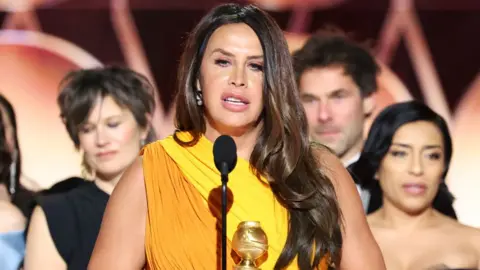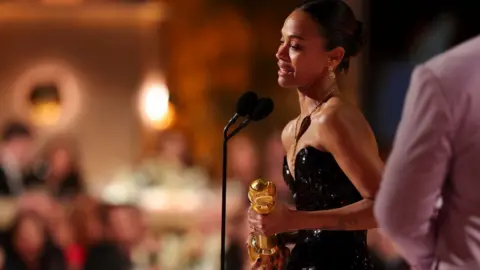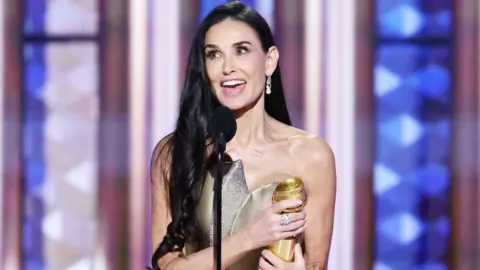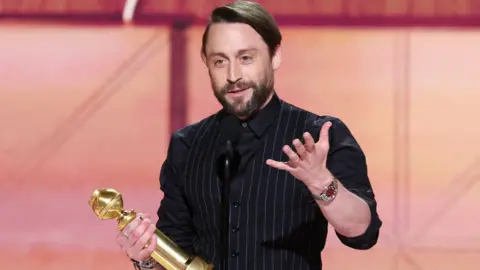Emilia Pérez and The Brutalist sweep Golden Globes

 Getty Images
Getty ImagesEmilia Pérez, a Spanish-language musical about a Mexican drug lord who changes gender, was the big winner at Sunday’s Golden Globe Awards.
The film won four prizes in total, including best supporting actress for Zoe Saldaña and best comedy or musical film.
Accepting the top prize, trans actress Karla Sofía Gascón told the audience: “I want to say to you, raise your voice, and say, ‘I am who I am, not who you want’.”
Other winners included Demi Moore and Kieran Culkin, while blockbuster Wicked took home the box office achievement prize.
The Brutalist, a three-and-a-half hour film about a Hungarian architect who builds a new life in the US after World War Two, won three prizes – best drama film, best actor for Adrien Brody, and best director for Brady Corbet.
 Getty Images
Getty ImagesSaldaña, who won best supporting actress for her role in Spanish-language musical Emilia Pérez, said: “My heart is full of gratitude.”
“I’m so blessed to be sharing this moment with my fellow nominees,” she continued. “I know this is a competition but all I have witnessed is just us showing up for each other and celebrating each other and it’s just so beautiful.”
The film also won best non-English language film which saw director Jacques Audiard take to the stage with a French translator to accept the award.
“In these troubled times I hope Emilia Perez will be a beacon of light,” he said. “I hope to offer a comforting hug to those who are worried… I urge them to keep they heads held high and hope for a better few days ahead.”
 Getty Images
Getty ImagesMoore was named best actress in a musical or comedy for her performance in body horror The Substance, which has revitalised her career and could see her score an Oscar nomination.
“I’m just in shock right now… I really wasn’t expecting that,” Moore said as she took to the stage. “I’ve been doing this a long time, over 45 years, and this is the first time I’ve ever won anything as an actor.”
Other winners have included Kieran Culkin and Zoe Saldaña and TV series Baby Reindeer and Shōgun.
In her acceptance speech, Moore said: “Thirty years ago, I had a producer tell me I was a popcorn actress, and at that time I made that mean that [awards] weren’t something I was allowed to have, that I could do movies that were successful and made a lot of money but couldn’t be acknowledged.
“And I bought in and believed that. That corroded me over time to the point where a few years ago I thought maybe this is it, maybe I was complete, I had done what I was supposed to do.
“And as I was at a low point, I had this creative, out of the box, bonkers script come across my desk, called the Substance, and the universe told me I was not done.”
 Getty Images
Getty ImagesSebastian Stan was named best actor in a musical or comedy for A Different Man, which sees him play a character who drastically changes his appearance.
“Our ignorance and discomfort around disability and disfigurement has to end now, we have to normalise it and continue to expose ourselves to it, and our children, encourage acceptance.”
Culkin won best supporting actor for his performance in A Real Pain, about two cousins who travel across Poland in memory of their grandmother.
“The first ever acknowledgement I got as an actor was a Golden Globe nomination when I was basically a kid. Now, it’s like the best date night my wife and I ever have,” he joked.
 Getty Images
Getty ImagesAccepting Wicked’s prize for box office achievement, director Jon M Chu paid tribute to the movie and stage musical’s loyal fanbase.
“This is for you, the fans out there, who came to the movie theatres, brought your friends and family, we saw your videos, your singalongs, your make-up, hair products, bakery items,” he said.
“It shows us how important making this stuff is, in a time when pessimism and cynicism rule the planet, that we can still make art that is a radical act of optimism.”
There was a surprise but welcome winner in the animated feature category, which saw box office juggernauts The Wild Robot and Inside Out 2 beaten by Flow, a film about animals who must work together to survive following a flood.
“This film was made by a very small, young, but passionate team, in a place where there isn’t a big film industry, so this is the first time a film from Latvia has been here so this is huge for us,” said director Gints Zilbalodis.
Elsewhere, Baby Reindeer was named best limited TV series, which was accepted by its writer and creator Richard Gadd.
“A lot of people ask me why a show this dark has gone on to be the success that it has,” he said. “And I think in a lot of ways, people were crying out for something that spoke to the painful inconsistencies of being human.
“For a while there’s been this belief in television that stories which are too dark and complicated won’t sell and no-one will watch them, so I hope Baby Reindeer has done away with that theory, because right now, when the world’s in the state that it’s in and people are really struggling, we need stories which speak to the complicated and difficult nature of our times.”
 Getty Images
Getty ImagesBritish actress Jessica Gunning was named best TV supporting actress for her portrayal as a stalker in the hit Netflix series.
In her acceptance speech, Gunning shared an anecdote about getting a hamster for Christmas as a child, and thinking that she couldn’t believe it was happening to her. She said that phrase had become the “soundtrack of my life this year”.
“Thank you to Richard Gadd, Baby Reindeer has changed my life in ways that I can’t even explain. I can’t believe this is happening to me,” she repeated, “and I know that eight-year-old me wouldn’t either, she’d be chuffed to bits.”
Irish actor Colin Farrell won his third Golden Globe, for playing the Batman villain Penguin in an HBO series of the same name.
On stage, he joked that he had “no one to thank” and “did it all by myself”.
Recalling the three hours it took to fit him with prosthetics to make him the bloated villain in his latest film, he said: “In the morning, I drank black coffee, listened to 80s music, and I became a canvas for that team’s brilliance.”
Farrell also said: “Thank you for employing me. And yeah, I guess it’s prosthetics from here on out.”
The Golden Globes mark the first major ceremony of the film awards season, which culminates with the Oscars on 2 March.
A win at the Globes can help boost a film’s profile at a crucial time, when Bafta and Oscar voters are preparing to fill in their nomination ballots.
Source link







